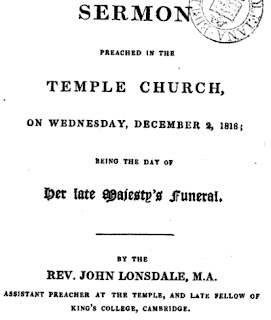"That great moral chain": A Hackney Phalanx sermon upon the death of a Queen
It is worth noting that the reference to "princes" as "God's viceregents upon earth" is not a particular claim for monarchical government - a claim renounced by Old High teaching (e.g. see Horsley's 1793 30th January sermon) - but, rather, an understanding of the vocation of the civil magistrate in light of Romans 13.
When the princes of the people, they, whom the God of order, and the Author of all power, has set over us, fall like other men; when they too, have the grave for their house, and make their bed in the darkness; when even they have said to corruption, thou art my father; to the worm, thou art my mother and my sister; the tribute of this natural sympathy is more imperiously demanded from us. They are, to a certain extent, God's vicegerents upon earth; they are his ministers to us for good; the channels through which he has appointed many of our blessings to flow; the pillars which he has set up to support the fabric of social peace and public security. He has commanded us, in his word, to pay them submission and honour; to make them the especial subjects of our prayers and thanksgivings. With what propriety, then, can we remain unconcerned spectators of the changes and chances that may befall them in this state of uncertainty? Surely we are bound by more than common ties to rejoice when they rejoice, and to weep when they weep.
And upon the same principle, that this feeling of reverence and affection should wait upon them in life, while they have wealth and power at their disposal, it should not desert them even in death, when nothing, but the shadow of their splendour, and the remembrance of their greatness remains. It should prompt us to break out into the mourning strain of the patriarch, How are the mighty fallen! It should attend them in sad and solemn respect, when they take up their last earthly rest with kings and counsellors of the earth, in that place of refuge, where the murmurs of sedition shall not disturb their repose any more, nor the burdensome cares of royalty harass and bow them down; for there the wicked cease from troubling, and there the weary be at rest.
The absence, or decay of this feeling, is no good symptom of a nation's health. It argues a weakness or dissolution of that great moral chain, which binds the sovereign and the people together, and which is at once the brightest ornament, and the strongest safeguard of both.




Comments
Post a Comment